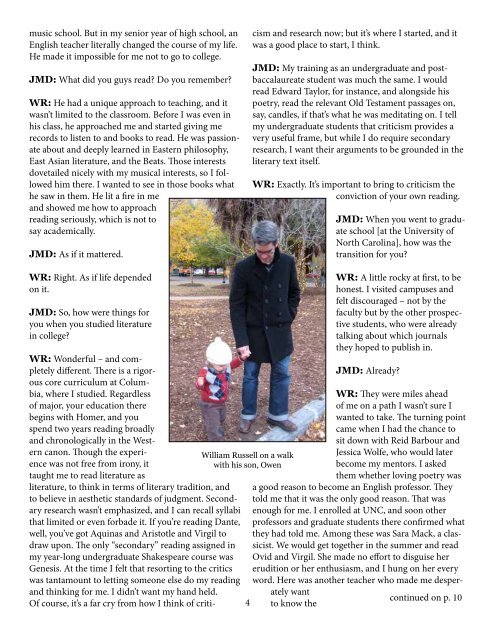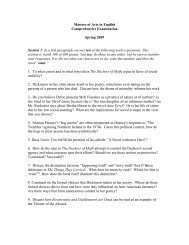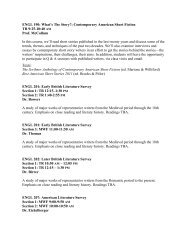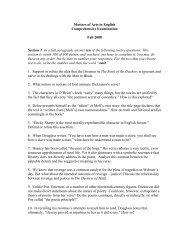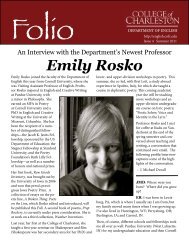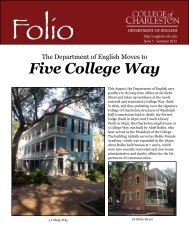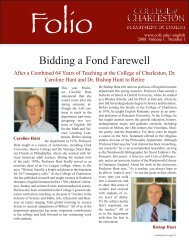Poet and Songwriter Paul Allen Retires - Department of English
Poet and Songwriter Paul Allen Retires - Department of English
Poet and Songwriter Paul Allen Retires - Department of English
Create successful ePaper yourself
Turn your PDF publications into a flip-book with our unique Google optimized e-Paper software.
music school. But in my senior year <strong>of</strong> high school, an<br />
<strong>English</strong> teacher literally changed the course <strong>of</strong> my life.<br />
He made it impossible for me not to go to college.<br />
JMD: What did you guys read? Do you remember?<br />
WR: He had a unique approach to teaching, <strong>and</strong> it<br />
wasn’t limited to the classroom. Before I was even in<br />
his class, he approached me <strong>and</strong> started giving me<br />
records to listen to <strong>and</strong> books to read. He was passionate<br />
about <strong>and</strong> deeply learned in Eastern philosophy,<br />
East Asian literature, <strong>and</strong> the Beats. Those interests<br />
dovetailed nicely with my musical interests, so I followed<br />
him there. I wanted to see in those books what<br />
he saw in them. He lit a fire in me<br />
<strong>and</strong> showed me how to approach<br />
reading seriously, which is not to<br />
say academically.<br />
JMD: As if it mattered.<br />
WR: Wonderful – <strong>and</strong> completely<br />
different. There is a rigorous<br />
core curriculum at Columbia,<br />
where I studied. Regardless<br />
<strong>of</strong> major, your education there<br />
begins with Homer, <strong>and</strong> you<br />
spend two years reading broadly<br />
<strong>and</strong> chronologically in the Western<br />
canon. Though the experience<br />
was not free from irony, it<br />
taught me to read literature as<br />
literature, to think in terms <strong>of</strong> literary tradition, <strong>and</strong><br />
to believe in aesthetic st<strong>and</strong>ards <strong>of</strong> judgment. Secondary<br />
research wasn’t emphasized, <strong>and</strong> I can recall syllabi<br />
that limited or even forbade it. If you’re reading Dante,<br />
well, you’ve got Aquinas <strong>and</strong> Aristotle <strong>and</strong> Virgil to<br />
draw upon. The only “secondary” reading assigned in<br />
my year-long undergraduate Shakespeare course was<br />
Genesis. At the time I felt that resorting to the critics<br />
was tantamount to letting someone else do my reading<br />
<strong>and</strong> thinking for me. I didn’t want my h<strong>and</strong> held.<br />
Of course, it’s a far cry from how I think <strong>of</strong> criticism<br />
<strong>and</strong> research now; but it’s where I started, <strong>and</strong> it<br />
was a good place to start, I think.<br />
JMD: My training as an undergraduate <strong>and</strong> postbaccalaureate<br />
student was much the same. I would<br />
read Edward Taylor, for instance, <strong>and</strong> alongside his<br />
poetry, read the relevant Old Testament passages on,<br />
say, c<strong>and</strong>les, if that’s what he was meditating on. I tell<br />
my undergraduate students that criticism provides a<br />
very useful frame, but while I do require secondary<br />
research, I want their arguments to be grounded in the<br />
literary text itself.<br />
WR: Exactly. It’s important to bring to criticism the<br />
conviction <strong>of</strong> your own reading.<br />
JMD: When you went to graduate<br />
school [at the University <strong>of</strong><br />
North Carolina], how was the<br />
transition for you?<br />
WR: Right. As if life depended<br />
on it.<br />
JMD: So, how were things for<br />
you when you studied literature<br />
in college?<br />
William Russell on a walk<br />
with his son, Owen<br />
4<br />
WR: A little rocky at first, to be<br />
honest. I visited campuses <strong>and</strong><br />
felt discouraged – not by the<br />
faculty but by the other prospective<br />
students, who were already<br />
talking about which journals<br />
they hoped to publish in.<br />
JMD: Already?<br />
WR: They were miles ahead<br />
<strong>of</strong> me on a path I wasn’t sure I<br />
wanted to take. The turning point<br />
came when I had the chance to<br />
sit down with Reid Barbour <strong>and</strong><br />
Jessica Wolfe, who would later<br />
become my mentors. I asked<br />
them whether loving poetry was<br />
a good reason to become an <strong>English</strong> pr<strong>of</strong>essor. They<br />
told me that it was the only good reason. That was<br />
enough for me. I enrolled at UNC, <strong>and</strong> soon other<br />
pr<strong>of</strong>essors <strong>and</strong> graduate students there confirmed what<br />
they had told me. Among these was Sara Mack, a classicist.<br />
We would get together in the summer <strong>and</strong> read<br />
Ovid <strong>and</strong> Virgil. She made no effort to disguise her<br />
erudition or her enthusiasm, <strong>and</strong> I hung on her every<br />
word. Here was another teacher who made me desperately<br />
want<br />
to know the<br />
continued on p. 10


